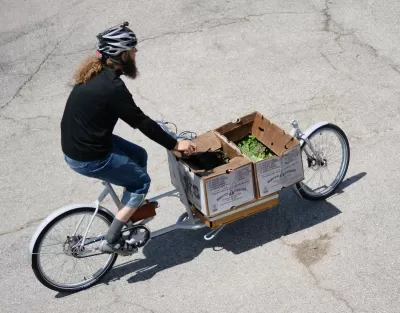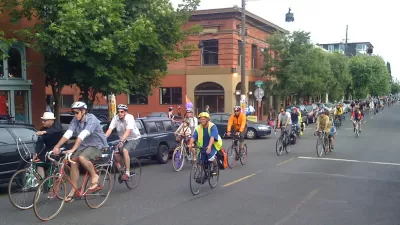Familiar with the perception that bicyclists are generally kids with no money and too much time? Emily Badger discusses the findings of a study that shows riders out-consume drivers over the course of a month for all businesses except grocery stores.

In the bike-friendly city of Portland, the government plans to encourage new riders by extending bicycle infrastructure to neighborhoods farther from the urban center. The problem, says Kelly Clifton, is "[a]s we move out beyond those areas into more auto-oriented areas, we start to see businesses say, 'Hey, wait a minute. You're taking away on-street parking to put in bike lanes, you're taking away the one parking spot in front of my store to put in a bike corral. I don't see many bikers around here. So what does this mean for me?"
For most business owners, drivers make up the majority of all customers. However, a study [pdf] conducted for the Oregon Transportation Research and Education Consortium finds that drivers visit establishments less frequently than cyclists and pedestrians, who make frequent trips and end up spending more over a month. "This finding is logical," says Badger, "It's a lot easier to make an impulse pizza stop if you're passing by an aromatic restaurant on foot or bike instead of in a passing car at 35 miles an hour." This behavior doesn't apply to grocery stores where drivers with their greater trunk capacity outspend other travelers.
For the study, Clifton and colleagues surveyed 1,883 people walking out of convenience stores, restaurants and bars; and another 19,654 out of supermarkets. "There are obviously some other factors at play here," admits Badger. "Families with cars are less likely to eat out than single young professionals on a bike. And we'd all prefer that drivers run up smaller bar tabs than pedestrians." Clifton raises the possibility of the "green dividend," which means that Portland's green infrastructure allows people to save on transportation and direct their money towards other expenses.
FULL STORY: Cyclists and Pedestrians Can End Up Spending More Each Month Than Drivers

Maui's Vacation Rental Debate Turns Ugly
Verbal attacks, misinformation campaigns and fistfights plague a high-stakes debate to convert thousands of vacation rentals into long-term housing.

Planetizen Federal Action Tracker
A weekly monitor of how Trump’s orders and actions are impacting planners and planning in America.

Chicago’s Ghost Rails
Just beneath the surface of the modern city lie the remnants of its expansive early 20th-century streetcar system.

Bend, Oregon Zoning Reforms Prioritize Small-Scale Housing
The city altered its zoning code to allow multi-family housing and eliminated parking mandates citywide.

Amtrak Cutting Jobs, Funding to High-Speed Rail
The agency plans to cut 10 percent of its workforce and has confirmed it will not fund new high-speed rail projects.

LA Denies Basic Services to Unhoused Residents
The city has repeatedly failed to respond to requests for trash pickup at encampment sites, and eliminated a program that provided mobile showers and toilets.
Urban Design for Planners 1: Software Tools
This six-course series explores essential urban design concepts using open source software and equips planners with the tools they need to participate fully in the urban design process.
Planning for Universal Design
Learn the tools for implementing Universal Design in planning regulations.
planning NEXT
Appalachian Highlands Housing Partners
Mpact (founded as Rail~Volution)
City of Camden Redevelopment Agency
City of Astoria
City of Portland
City of Laramie




























